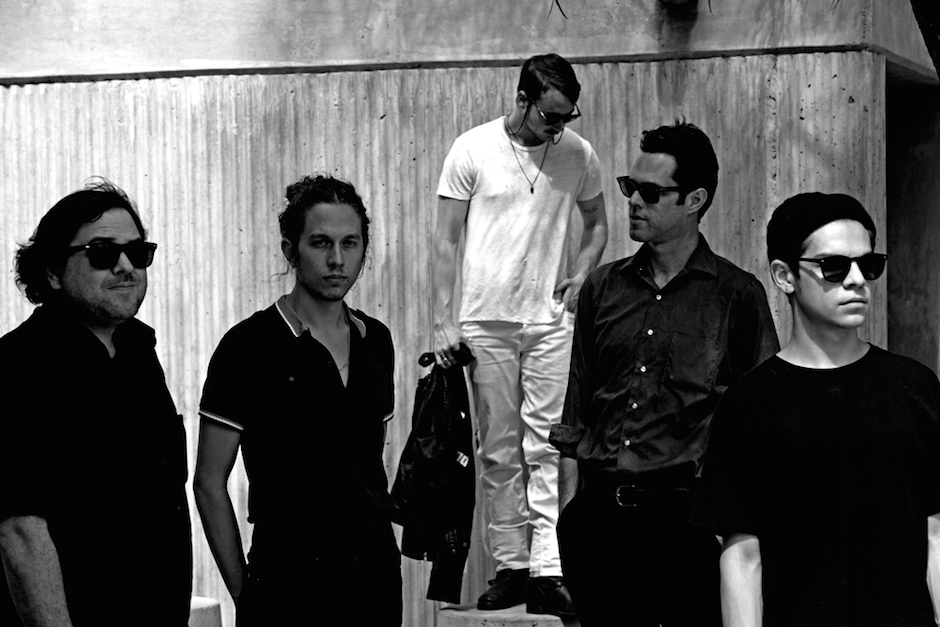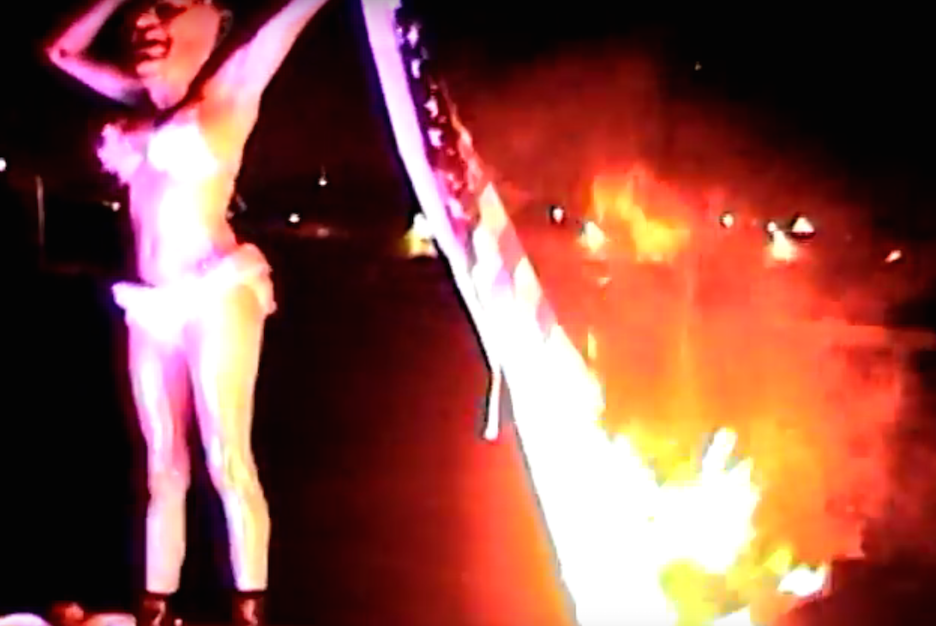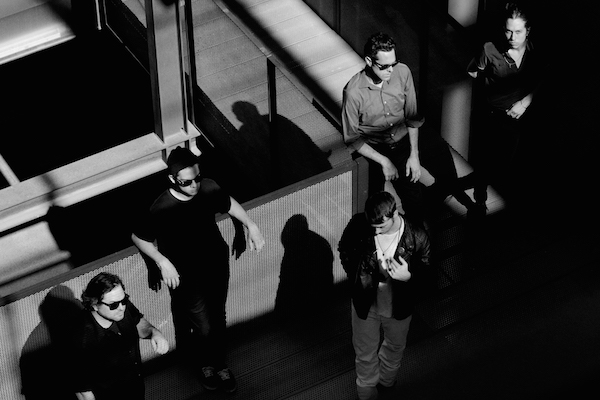Leaning back in a lawn chair in the backyard of a friend’s apartment adjacent to the bustling hellscape of Williamsburg’s Bedford Avenue, Destruction Unit frontman Ryan Rousseau is enjoying the warmth of the afternoon sun. A smile creeps across his face, a pair of Wayfarer-styled sunglasses — knockoffs — slides down the bridge of his nose, a few gray hairs at his temples blow gently in the wind, and his flannel shirt is open down to his chest.
He’s the perfect picture of placidity in one of the country’s hardest places to find peace. The rest of the Arizona punks — Rousseau’s bassist brother Rusty, 34, drummer Andrew Flores, 20, guitarists Jes Aurelius and Nick Nappa, both 26, — are huddled in a half circle around him, looking expectantly toward their leader. He’s forgotten the question, or maybe, forgotten that there’s even been a question asked of him. He stares at a cloud rolling by.
“Have him do some Algebra or something,” Aurelius jokes.
Rousseau, 37, is a few hours deep into a couple of hits of LSD, as is the near-silent Flores, so, at this point, complex math might be an easier proposition than trying to untangle the band’s history. His long-running solo project turned noise-punk quintet has released austere solo synth tracks, recorded sloppy acoustic songs with the late Memphis fuzz-pop great Jay Reatard, and in 2011, Destruction Unit kicked on a distortion pedal and swelled to include the rest of the guys hanging out in this backyard.
But he’s having a bit of trouble stringing all of those events together in a logical narrative, nailing down dates and hard facts. When asked about his relationship with former Germs drummer Don Bolles, who provides an atonal guitar solo on the band’s forthcoming album Negative Feedback Resistor, Rousseau begins an explanation of the Germs‘ whole history. It’s as if his friendship began the very day Bolles picked up the sticks behind Darby Crash and Co., which was, incidentally the same year that he was born. “Ever since I was a kid…” he starts to explain with a goofy grin now plastered on his face. “[My] connection to this guy has been really uncanny.”
His bandmates chuckle. Flores rolls and lights a joint, passes it to Rousseau — to help him clear his head. The weed makes its way around the backyard before Rousseau takes another drag and deposits the roach onto a wire mesh table, next to a few other reeking butts. He pauses, looks into the distance, zones out. Everyone else sits, chats, chainsmokes the sunshine away.
But today’s a workday — at least partially. Three months before the release of their second LP with their current lineup (and Ryan’s eighth overall under the Destruction Unit banner), they’re on a marathon cross-country tour, winding through Texas and then up the East Coast, pretty much just to get out of the heat. “It’s 110 degrees in Arizona, so any reason to not be in the area is good,” Flores says.
This tour finds them playing bigger venues than ever, likely because after associating themselves with a formidable label, Brooklyn scuzz purveyors Sacred Bones, their brittle bluster is finally reaching the right ears. “People were very confused [at our first shows together],” Aurelius says. “Those people are starting to come around and get into weirder s—t but at the time, they were not into it at all. They just wanted to do a bunch of coke and jump around or something. And now, everyone smokes weed.” That cannabinoid affinity perhaps explains the involvement of Adult Swim, who funded the upcoming record in part and will put it up for a free download at the same time it hits stores. “I guess they just have a bunch of money left over at the end of the year that they need to get rid of,” he explains. “And they decided to give it to a bunch of psychopaths.”
In September, the noisy border-crossers will release Negative Feedback Resistor, their first full-length since 2013’s Deep Trip. Made in less than a month during a particularly sleepless and manic period in Los Angeles, the record is an unhinged and blown-out document like little they’ve made before. The bludgeoning sonics from past releases with this cast of players remain constant, but they’ve sanded off all of the hooks and handholds, offering only sprawling wastelands. “When bands get bigger, they tend to get easier to digest,” Nappa says. “So we wanted to go the opposite direction, make it way harder to listen to.” Tonight, they’ll bring some of that in-the-red ecstasy to Bushwick’s Palisades, but for now they’re content to hang and smoke, to work and not, to try and relate their complicated history.
Destruction Unit owes its beginnings to FedEx, Ryan will explain later, once his head has cleared. Ryan and Rusty mostly grew up in Arizona, but they spent a stint in Memphis — “in the ‘80s” is the best time marker they can give me — where Ryan would eventually return, in the late ‘90s, and fall in with the local punk crowd. Memphis scene fixture Jack Oblivion gave Rousseau a phone number for the wunderkind Reatard. The pair hit it off and Ryan joined an early version of his wrecking crew the Reatards, who barked out 90-second bar-punk jams like no one else in the area (or anywhere really) and then hung on for years. He doesn’t have much to say about that era, except that he didn’t like Memphis all that much and he soon left, returning to Phoenix where his friends were.
Bored and working a job for America’s preeminent parcel services in 2000, he managed to start making solo recordings at home under the Destruction Unit banner, and occasionally schlep back to Memphis for Reatards shows. “Because I worked for FedEx, and I could fly on a cargo plane for free,” he explains. “It was cool. You’d sit in the cockpit or right behind it, staring at a wall. You have to book weeks in advance, but it kind of worked. That’s why I had the job anyway.”
During the off-time from the boisterous Reatards shows and wild parties in Memphis, Destruction Unit started off as an outlet for lonely solo compositions cut straight to a four-track — lo-fi affairs that bear little resemblance to the muscular efforts the band releases today. An early album was funded in its entirety after Rousseau made a trip from Phoenix to Reno on a whim and won $1,000 playing video poker. That’s pretty much how Rousseau’s worked over the years, following wherever luck leads him at a given moment.
Then, in 2010, Rousseau had a shift, chemically aided. “Bands would leave all their weed at my house,” he explains, still leaning back on the sturdy patio furniture in Brooklyn. “Because there are border checkpoints going into Mexico with dogs that would smell it and s—t. So I started smoking a lot of weed. It f—king blew my mind. All of a sudden, I just needed a band that wasn’t boring.”
Aurelius, Nappa, and Rusty (fresh off a job for an ambulance company) joined right around the same time, no one can remember exactly when. But they brought a heft and an experimentalism that Destruction Unit hadn’t had before. Nappa and Aurelius spend their time time outside the band on a host of noise and dance side projects, including Marshstepper (famous for their ritualistic and occasionally violent and nudity-filled live shows), a monthly Los Angeles rave party called Threshold, and an art collective-cum-tape-label called Ascetic House. Other D-Unit members have time to take psychic journeys in the desert, but those two barely have time to sleep.
That manic energy has helped cement the current Destruction Unit modality: Play incredibly fast and incredibly loud, and bring whatever happens offstage, onstage. Whether that’s, like today, Ryan tripping on acid, or a pair of friends showing up hoping to play onstage with them, they’re down for whatever. “It’s so chaotic at times that all these elements contribute to the live show, ” Aurelius says. “And there’s some good shows that happen just because everyone’s in such a f—kin’ weird headspace.”
Ryan concurs, in his own addled way. While he’s more likely to take a vacation than the rest, he appreciates the hectic environment that six insanely busy guys in a van can create. “You’re all stuck on this planet, trying to live this life, so you might as well get all the good ingredients and boil it up and f—kin’ have a party, you know what I mean?” he says. “I don’t know any other way to put it.”
Tonight, like most nights, there’s a show to play. That requires getting our stoned crew and a veritable pile of amps across the mile and change to Bushwick. Destruction Unit — along with their publicist, booking agent, a friend, and me — pile into the back of a van, as Ryan, still tripping, takes the wheel. He pops in a cassette of Memphis rap, taped off YouTube according to their publicist, and takes off. It’s a surprisingly uneventful journey, and it’s a comfort, in a strange way, that Rousseau’s made drives like this before. They arrive at the venue, with Flores and Rousseau still occasionally getting lost in lights and the distance, but it’s just another day in the life.
Everyone except Ryan heads across the street to the so-called punk alley, a row of shipping containers that have been converted into small shops peddling records, tapes, Marxist literature, and all sorts of other unsettling ephemera. After staring at a row of old sci-fi B-movies on VHS, Flores decides to buy one of a few creepy doll heads (his choice: a disembodied brunette) that one of the vendors has for sale. The store’s proprietors offer the D-Unit boys a mixture of liqueurs in a plastic cup, they invariably accept.
On days like these it’s easy to see how they end up making records like Negative Feedback Resistor. Songs feel claustrophobic and tight, bursting with energy, but still stagnant and inescapable — a prickly mire that you can’t escape, even when the needle moves over to the next track. “It definitely can be hard to latch onto if someone just wants to listen to the hit single,” Aurelius says. “At least for what we’re doing, it’s more about experience and energy, and power and stuff, versus, being like, ‘Oh yeah, this is the track you can sing along to, or this is the track with the f—king one riff or whatever.'”
It’s about a feeling, rather than anything concrete, something that’s cemented once they finally take the stage hours later. They’ve spent all day acting like normal people, but now they look like they’re out of their heads. Even the diminutive Flores, with his sunglasses and beanie in the summer heat, appears just a little surreal. Ryan’s shirt is now open to his navel, Nappa’s curly mane is pulled up. And it just happens, all at once. Aurelius and Ryan offer an ambient intro but then there’s this crush, a clatter and confusion that comes from everyone hitting at the same time, distortion and phasers and reverbs colliding and thickening into a sickly stew (perhaps the “boil” Ryan was referring to?) of blistered guitar lines and sunburnt drum thumps. The gathered punk kids aren’t moved into the frenzy you might expect for one of the best live bands in the game playing at this piercing volume, but that could be because, as an attendee will explain to me later, “it’s really f—king trippy man.”
It can be hard to hear the influence of psych-rock on their sound, but you can hear the influence of psychedelics, of boundaries blurred and smeared. They rub at the edges of their songs until they stir into one expansive piece. Nappa stands on an amp, throws his guitar and shoves a contact mic into the back of his throat and screams, flaring his nostrils, bugging his eyes. Is this punk? Well, no, not exactly. This is rock’n’roll in 2015, a bid for nothing else but your attention from guys who work hard enough to deserve it. This is diving headlong into the deep trip, and then you just end up here in Brooklyn, like out of nowhere, like nothing else, like in a dream. Fortune, drugs, and FedEx have carried Ryan Rousseau; he can try to look backward or forward, but it’s easier to just stand and scream.






